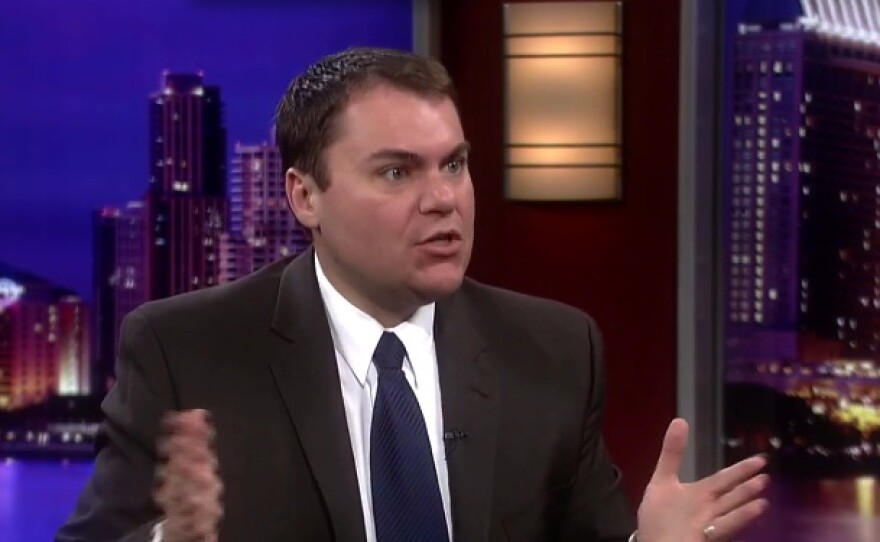Councilman and mayoral candidate Carl DeMaio said the San Diego Municipal Employees Association’s unfair practices claim against the pension reform ballot initiative is not valid because the measure currently headed to the June ballot is a separate entity from the one originally proposed by Mayor Jerry Sanders.
“What they’re referencing in their complaint is the wrong ballot measure,” DeMaio told KPBS. “The mayor, yes, announced he wanted to do a ballot measure in December and January of 2010 and 2011. But that ballot measure went by the wayside in favor of the citizens’ initiative that the broad coalition worked on.”
“You have stories on KPBS that show the mayor set aside his ballot measure and a coalition ballot measure came out that the mayor and I both supported as private individuals,” DeMaio added.
Michael Zucchet, the general manager of SDMEA, called DeMaio's argument "fascinating."
"Of all the things that’s come out of his mouth,” Zucchet said. “In January 2011, Mayor Sanders, standing behind a city lectern with a city seal at the 'State of the City' address, announced, quote, the city attorney and I, Mayor Sanders, are going to put on the ballot an initiative to eliminate pensions, go to 401(k)s, etc., etc., which is what we have today."
Last month the SDMEA filed a complaint with the California Public Employment Relations Board, or PERB, and last week, PERB agreed the measure should not be on the June ballot. It requested a preliminary injunction against the ballot measure, which would keep the measure off the ballot to give PERB time to review the case.
The ballot initiative would replace most new city hires’ pensions with 401(k)-style plans and freeze the base pay of current employees for five years.
(Story continues below the video.)
SDMEA’s complaint stated Sanders should not have actively supported the measure because he is a public official.
If an initiative is placed on the ballot using collected signatures, not legislation, the city can avoid the requirement that it meet with unions over changes to the pension system. Sanders has said he acted as a private citizen in his work to support the measure, but SDMEA disagreed.
“As the city’s CEO and chief labor negotiator, this mayor has used his city-paid time, resources, power, prestige, visibility and ‘good offices’ to inspire, write, negotiate, endorse and sponsor the proposed citizens initiative which he has described as his legacy as mayor,” its complaint stated.
But DeMaio said the reform plan proposed by the mayor was not the same as the one currently headed for the ballot, and said the law allows everyone, even public officials, to donate money to and support ballot measures.
“Everyone has a right to support, endorse as a private individual,” DeMaio said. “In no way, shape, or form can the unions claim or support a contention that the mayor, myself, or anyone else in city government used official resources to advance a ballot measure.”
Zucchet said while SDMEA opposes the initiative because it thinks the proposed pension reform will harm the city's finances, he said his organization made the complaint because the city broke the law.
"The city screwed up in the way that they put it on the ballot, and the rule of law matters, or at least it should matter," Zucchet said. "And that’s what we’re seeing with the enforcement agency coming down on it this week."
DeMaio said the record number of signatures collected to put the measure on the ballot shows it comes from the people of San Diego.
“It’s offensive that the unions are trying to rewrite history and then advance their claim in a bogus lawsuit with one goal, they want to kick this ballot measure off the ballot,” he said. “They don’t even want to have people vote on it.”
He said the people of San Diego will agree the initiative comes from citizens because they signed petitions to put it on the ballot.
“San Diegans are not stupid, they saw it themselves, they signed it themselves," he said. "At the end of the day, the citizens have a constitutional right under the State Constitution, we have a right under the City Charter, to put anything we so choose up for a public vote if we collect enough signatures, and in this case that clearly happened.”
But Zucchet said DeMaio and his supporters lied to people about the effectiveness of the measure when asking them to sign petitions.
"Voters or people who might sign the petition were told this might save billions of dollars, if I was told that, and I believed it, I’d probably sign it, too," he said. "That’s not true, and that'll be clear when the independent budget analyst of the city of San Diego does her analysis in the next few weeks."
Zucchet said if given the chance, unions will happily negotiate with the city about their pensions.
"We have, we will in the futre and we’d love to on this," he said. "This is our specific request, admit that it’s a city initiative, not a sham citizens’ initiative, and sit down and talk about it and go through the proper procedure."
DeMaio said PERB came to the decision it did because it is biased toward unions.
“I read their complaint and it’s jaw dropping how factually inaccurate the complaint was,” he said. “It looked like it was written by the city’s local labor unions here for government employees.”
He referenced the state agency’s name as further proof of its bias.
“Listen to it, Public Employees Relations Board, so they see things from a certain perspective, from the government unions,” he said.
PERB will hold a conference Thursday, Feb. 23 on the issue. It is expected to file a lawsuit in San Diego County Superior Court and will participate in a preliminary hearing on the issue on Tuesday, Feb. 21.
DeMaio said if the issue goes to court, he expects a judge will find in his favor.
"I believe a judge will toss it out of court and will laugh it out of court, really," he said.
Zucchet disagreed.
"I don’t want to be as sanctimonious as sometimes (City Attorney) Jan Goldsmith is about what’s going to happen in court, but I would say the record is pretty clear about the conduct here," he said.









